Prison gerrymandering may not be a familiar term, but it is something that you should be aware of because you or people you know may be directly impacted. Prison gerrymandering is when our incarcerated neighbors are counted in the Census as part of the districts where the prison facilities are located instead of hundreds of miles away in the communities they are from and will return to after their stay. This means that when district maps are created, people are counted in rural, downstate communities for ten full years, regardless of their prison sentence length.
In Illinois, we have made great strides towards banning prison gerrymandering by passing the No Representation Without Population Act, but the implementation of the law is still left to be completed. Our incarcerated neighbors need to be informed of their rights to update their addresses, and the Illinois Department of Corrections has not done their part to let them know. It is up to us to do so! But why should you care?
- Prison gerrymandering is voter suppression.
By counting incarcerated neighbors within districts where they cannot and most likely will not ever vote, prison gerrymandering makes it so that the voting and political power of the people in these smaller rural communities have more weight. Simplified, if we have districts of 100 people each, and 25% of the people are incarcerated, that means that the remaining 75 have the equivalent power of 100 people in other districts. This is a major equity issue for Black communities that are disproportionately hurt by mass incarceration. Representation should be equitable for all across the state.
- Prison gerrymandering weakens representation.
Inversely, by counting our incarcerated neighbors in the districts of the prisons, their home communities receive weaker representation. This means that the people within that community will not have the chance to have their voices heard at an equal weight as someone in a nearby community with no returning incarcerated neighbors. Using the same example of districts with 100 people each, the voting power of that community is diluted by not already counting those 25 additional people who will return to the community after serving their sentences.
- Prison gerrymandering impacts resource and funding allocation.
When our incarcerated neighbors are counted by the Census in a rural district in southern Illinois, these communities receive funding and resources as if the full population were able to take advantage of them and use them. This is not the case for incarcerated folks. As they are in the facilities, they cannot take advantage of the resources given to that population. This means that one community is receiving more money than it needs for its population. This also means that the home communities of our incarcerated neighbors are underfunded and underresourced because the returning population is not included in the projections for that community.
- Prison gerrymandering further disenfranchises urban Black communities.
Mass incarceration in Illinois disproportionately affects Black urban areas, causing an overrepresentation of Black people in prison. By stealing representation from their communities, we are allowing prison gerrymandering to continue the pattern of oppression that our Black communities face. However, this is one form of oppression we have the chance to eliminate.
- We all have the opportunity to make a difference.
You can get involved in this work directly. On Saturday, April 26th at 12:30 PM, join CHANGE Illinois and Rainbow PUSH Coalition at 930 E 50th St, Chicago, IL. We will use this time to write to our incarcerated neighbors and let them know about their rights to update their home addresses. It is up to us to make sure that the ban on prison gerrymandering in Illinois gets successfully implemented ahead of the 2030 census.
